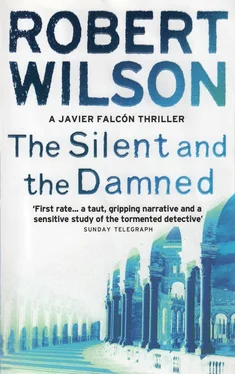Elvira's drawn features eased away from the intensity of Falcón's glare. They both ended up looking at the darkening cumin complexion of Lobo's furious face.
'For the moment, Inspector Jefe,' he said, 'in the light of what you've just told us about one of our senior officer's involvement in this case, I am going to ask you to do nothing and say nothing.'
In the silence that followed that request, which included a weighty admission, the questions started stacking up in Falcón's mind. He couldn't ask a single one. He said good morning and went to the desk to pick up the tapes.
'Best to leave those,' said Lobo.
Falcón's hand withdrew as if the wolf had snapped.
Down in the outer office Ramírez was sitting with his feet up, smoking. He put a finger to his lips, nodded next door and mouthed the words Virgilio Guzmán.
'I can't talk to you now, Virgilio,' said Falcón, walking behind Guzmán and into his chair.
'About what?'
'Anything.'
'What about Alfonso Martinez and Enrique Altozano?'
'One is in intensive care, the other has disappeared.'
'Enrique Altozano miraculously reappeared this morning,' said Guzmán. 'Doesn't that sound like someone who's been told the coast is clear?'
'It can sound like anything to speculative minds.'
'All right,' said Guzmán. 'Shall I tell you about Miguel Velasco?'
'I already know about him.'
'What do you know?'
'That he was in the Chilean military…'
'That's a bit vague.'
'Is it going to help me to know any more than that?'
'I'll give you the short history and then you tell me,' said Guzmán. 'He was born in 1944, the son of a Santiago butcher. He was an alumnus of the Catholic University and a member of Patria y Libertad. His mother died in 1967 from a heart attack. He joined the Chilean military in 1969. After the coup he was transferred to the force that was eventually to become the DINA in June 1974. His father, who did not like Allende's politics but also did not agree with the Pinochet coup, disappeared in October 1973 and was never seen again. During his service with the DINA he became one of the chief interrogators at the Villa Grimaldi and a close personal friend of the Head of the DINA – Colonel Manuel Contreras.'
'That note he held in his hand when he died, I heard that it was an inscription on a cell wall in the Villa Grimaldi,' said Falcón. 'I was also told he was known by the MIR as El Salido.'
'Perhaps you didn't hear about his work at the Venda Sexy,' said Guzmán. 'That was the name of a torture centre at 3037 Calle Iran, in the Quflu quarter of Santiago de Chile. It was also known as La Discoteca because loud music was heard coming from it day and night. Before Miguel Velasco was moved to the Villa Grimaldi he devised the techniques practised there. He forced family members to watch and participate in taboo sexual acts such as incest and paedophilia. Sometimes he would encourage his fellow torturers to join in.'
That helps explain things… or rather, not explain but…'
Tell me.'
'Finish the biography, Virgilio.'
'He was an outstanding interrogator, and from the Villa Grimaldi he was moved to one of the active cells in Operation Condor, specializing in kidnappings, interrogations and assassinations abroad. In 1978 he was moved to the Chilean Embassy in Stockholm, where he headed covert operations against the Chilean expatriate community. He transferred back into the military in late 1979 and it's believed that he received some CIA training prior to developing a lucrative "drugs for arms" business. That trade was exposed in 1981 and there followed a trial in which he acted as a witness for the prosecution. In 1982 he was put into a witness protection programme, from which he disappeared almost immediately.'
'Stockholm?' asked Falcón.
'The Swedish Prime Minister, Olaf Palme, was vociferous in his disgust at the Pinochet regime. In the days after September 11th, the Swedish Ambassador in Santiago, Harald Edelstam, ran around the capital extending asylum to anyone who was resisting the coup and so Stockholm, naturally, became a centre for a European anti-Pinochet movement. A DINA/CNI cell was set up there to run drug-smuggling operations in Europe and to spy on Chilean expatriates.'
'Interesting… but none of it helps me any more,' said Falcón. 'That case is about to be closed.'
'I can sense some disappointment in you, Javier.'
'You can sense what you like, Virgilio, I've got nothing to talk to you about.'
'People think I'm a bore, because a lot of my sentences start with the phrase "When I was working the death squads story…"' said Guzmán.
Ramírez grunted his agreement from the outer office.
'You must have learned a lot…'
'During that investigation I always managed to turn up in people's offices at crucial times,' said Guzmán. 'Call it Zeitgeist or tapping into the collective unconscious. Do you believe in all that crap, Javier?'
'Yes.'
'You've become monosyllabic, Javier. It's one of the first signs.'
'Of what?'
'That I haven't lost my sense of timing,' said Guzmán. 'What do you think the collective unconscious is?'
'I'm not in the mood, Virgilio.'
'Where have I heard that before?'
'In your own bed,' Ramírez shouted from the outer office.
'Have a go, Javier.'
'You're not going to talk your way in here,' said Falcón, pushing over a note with his home address and 10 p.m. written on it.
'Do you know why I left Madrid?' said Guzmán, ignoring the note. 'I was pushed. If you ask people why, they'll tell you that I'd started to live in a hall of mirrors. I didn't know what was real any more. I was paranoid. But the reality was that I was pushed because
I'd become a zealot. I got that way because the stories I would run with always had something that made me writhe with rage. I couldn't control it. I'd become the worst thing possible – the emotional journalist.'
'We don't allow that in the police force, either… or we all start cracking up.'
'It's an incurable disease,' said Guzmán. 'I know that now, because when I read what Velasco used to get up to in the Venda Sexy I hit that same white-hot vein of rage. That's what he used to do to human beings. Not just torture them, but fill them with his own appalling corruption. And the next thing I know I'm back to thinking that was Pinochet. That's what Pinochet thought of human beings. And why was he there? Because Nixon and Kissinger wanted him there. They would rather have someone who promoted the electrocution of genitals, the raping of women, the abuse of children than… than what? Than a tubby, bespectacled little Marxist who was going to make life difficult for the rich. Now you see my problem, Javier. I have become what my bosses used to call me – my own worst enemy. You're not allowed to feel, you're only allowed to report the facts. But, you see, it's in that feeling that my instinct lies and it hasn't failed me, because I know that the rage I felt when I found out about Miguel Velasco's speciality guided me here this morning. And it's guided me here because it wants my nose to be in the door of the cover-up as it slams shut.'
Guzmán snatched up the note, kicked back his chair and stormed out.
Ramírez loomed large in the doorway, looking back at the vapour trail left by Guzmán in the outer office.
'He's going to do himself some harm if he carries on like that,' said Ramírez. 'Is he right?'
'Did you see me come back with anything?' asked Falcón, opening his hands to show no tapes.
'Lobo's a good man,' said Ramírez, pointing a big finger at him. 'He won't let us down.'
'Lobo's a good man in a different position,' said Falcón. 'You don't get to be Jefe Superior de la Policía de Sevilla unless people want you to be. He has political pressure on his shoulders and he has a big mess in his own house, left by Alberto Montes.'
Читать дальше
Конец ознакомительного отрывка
Купить книгу












